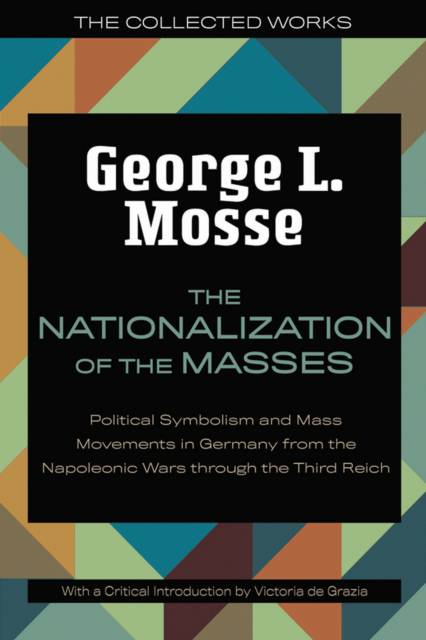
Je cadeautjes zeker op tijd in huis hebben voor de feestdagen? Kom langs in onze winkels en vind het perfecte geschenk!
- Afhalen na 1 uur in een winkel met voorraad
- Gratis thuislevering in België vanaf € 30
- Ruim aanbod met 7 miljoen producten
Je cadeautjes zeker op tijd in huis hebben voor de feestdagen? Kom langs in onze winkels en vind het perfecte geschenk!
- Afhalen na 1 uur in een winkel met voorraad
- Gratis thuislevering in België vanaf € 30
- Ruim aanbod met 7 miljoen producten
Zoeken
The Nationalization of the Masses
Political Symbolism and Mass Movements in Germany from the Napoleonic Wars Through the Third Reich
George L Mosse
€ 37,45
+ 74 punten
Omschrijving
First published in 1975, The Nationalization of the Masses is George L. Mosse's major statement about political symbols and the means of their diffusion. Focusing on Germany and, to a lesser degree, France and Italy, Mosse analyzes the role of symbols in fueling mass politics, mass movements, and nationalism in a way that is broadly applicable and as relevant today as it was almost fifty years ago. In this analysis Mosse introduces terms like "secular religion," "political liturgy," "national mystique," "the new politics," and "the aesthetics of politics" that are now standard in studies of nationalism and fascism, demonstrating the importance of his cultural, anthropologically informed lens to contemporary discourse. This new edition contains a critical introduction by Victoria de Grazia, Moore Collegiate Professor of History at Columbia University, contextualizing Mosse's research and exploring its powerful influence on subsequent generations of historians.
Specificaties
Betrokkenen
- Auteur(s):
- Uitgeverij:
Inhoud
- Aantal bladzijden:
- 248
- Taal:
- Engels
- Reeks:
Eigenschappen
- Productcode (EAN):
- 9780299342043
- Verschijningsdatum:
- 3/01/2023
- Uitvoering:
- Paperback
- Formaat:
- Trade paperback (VS)
- Afmetingen:
- 150 mm x 226 mm
- Gewicht:
- 358 g

Alleen bij Standaard Boekhandel
+ 74 punten op je klantenkaart van Standaard Boekhandel
Beoordelingen
We publiceren alleen reviews die voldoen aan de voorwaarden voor reviews. Bekijk onze voorwaarden voor reviews.









